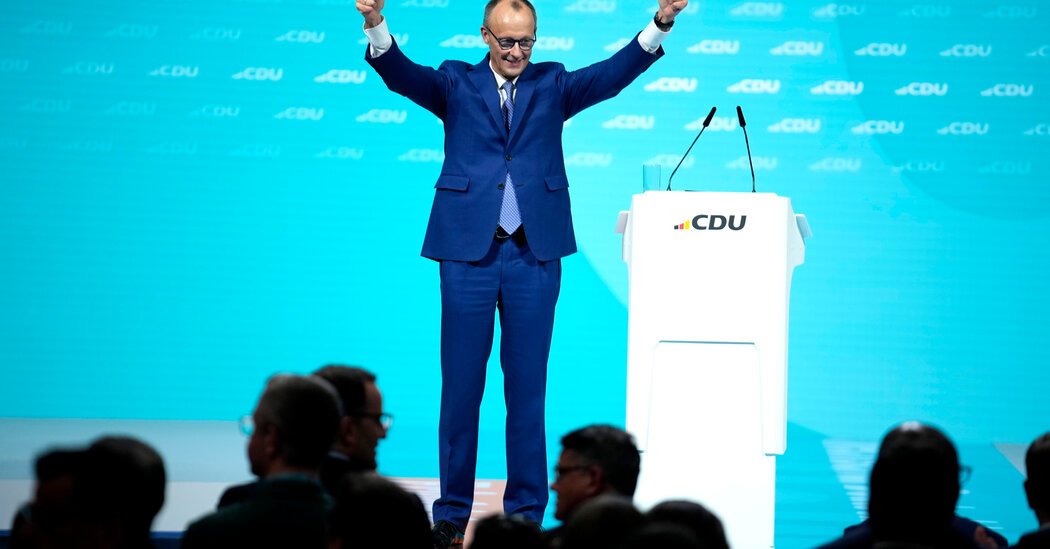Friedrich Merz, the man favored by early exit polls to be Germany’s next chancellor after elections on Sunday, is a conservative businessman who has never been a minister and was forced out of government years ago in a power struggle with Angela Merkel.
The leader of the conservative Christian Democratic Union, Mr. Merz earned his fortune working in the private sector before returning to politics at 63.
That business background appealed to many Germans amid the political turbulence caused in part by stagnation in one of Europe’s largest economies.
Mr. Merz, now 69, was born and still lives in the Sauerland, a district of western Germany known for hills, heavy food and picturesque nature. It was from there that he was first elected into the European Parliament in 1989 and then the German Parliament in 1994.
While he comes from the same party as Ms. Merkel, the former chancellor, Mr. Merz — a pugnacious old-school politician — is in many ways her opposite.
He rose through the ranks to lead the Christian Democrats’ parliamentary group, but was ousted by a rising star in the party — Ms. Merkel. It was then that Mr. Merz pivoted from politics and started a lucrative law career.
He got rich working as a lawyer and a lobbyist. When Ms. Merkel was getting ready to retire, Mr. Merz got back into politics. In 2018, when he returned to the political stage, Mr. Merz promised he could stem the rise of the far-right Alternative for Germany party, known as the AfD, by moving his party further right on key issues like migration and crime.
Mr. Merz re-entered Parliament in 2021 and — after two failed attempts — won the party leadership in 2022.
As party leader, however, he made a number of gaffes — like claiming in September 2023 that refugees were having their teeth redone at taxpayers’ expense while regular German patients were unable to get appointments. (The head of the German Dental Association denied this.) And his insistence that he is just a regular member of the middle class — despite significant personal means — has been mocked by some Germans who see him as being divorced from the economic reality many members of the middle class face.
Still, Mr. Merz managed to coalesce his party around him and shift it to a more traditional conservative posture after Ms. Merkel’s long tenure took the party further to the left. His business experience is considered a strength, as he promises to restore growth to the German economy.
As chancellor, as a conservative and committed trans-Atlanticist, Mr. Merz would be considered a better match for President Trump than the current Social Democratic chancellor, Olaf Scholz. Mr. Merz is also expected to lead a foreign policy more aligned with Mr. Trump’s ideas about Europe’s taking responsibility for its own defense.
Still, Mr. Merz — who is known to be assertive and direct, if a bit awkward — pushed back strongly against Mr. Trump’s latest comments siding with Russia about Ukraine, as well as what was seen as interference in Germany’s election by Vice President JD Vance when he criticized Europe for sidelining far-right voters and their parties.
Boldness is characteristic of Mr. Merz, analysts say, and reflects a conviction that Germany must be more forcefully engaged in European and global affairs. Mr. Scholz has often been criticized for his tentativeness and caution, even from within his own coalition.
Just last month, Mr. Merz showed his willingness to act brashly when he presented a migration measure and then a bill in Parliament that he knew he could pass only with the hard-right AfD, despite earlier promises never to work with them. The political maneuver did not go well: It prompted hundreds of thousands of Germans to take to the streets in protest, dissent within his party and a rare public rebuke from Ms. Merkel.
Mr. Merz has vowed to carve out a more prominent German role inside the European Union and NATO, to pursue better relations with France and Poland, and to take a tougher stance against China, which he has described as a full member of the “axis of autocracies.”
He has also promised more forthright support for Ukraine’s battle against Russia — saying, for instance, that he would provide Ukraine with Germany’s long-range cruise missile, the Taurus. And Mr. Merz has pledged that Germany will meet and surpass the current NATO target of 2 percent of gross domestic product being spent on the military for the long term.
In a recent foreign-policy speech at the Körber Foundation, Mr. Merz, a former member of the European Parliament, promised to provide German leadership in Europe, which has not been a priority for Mr. Scholz, and to establish a national security council in the chancellery.


